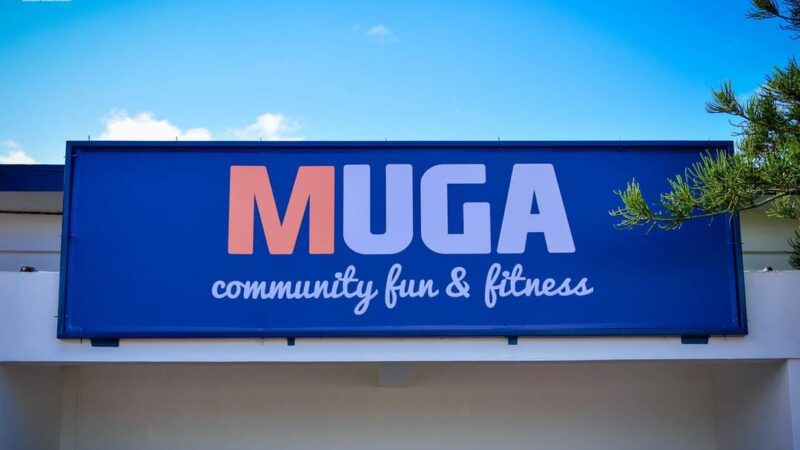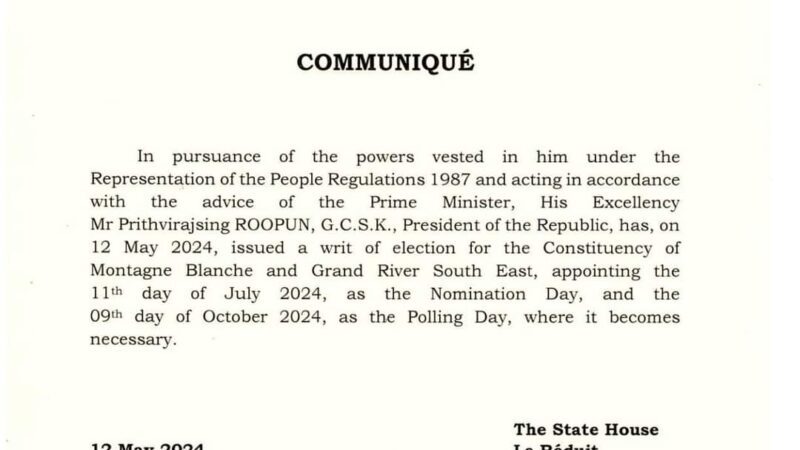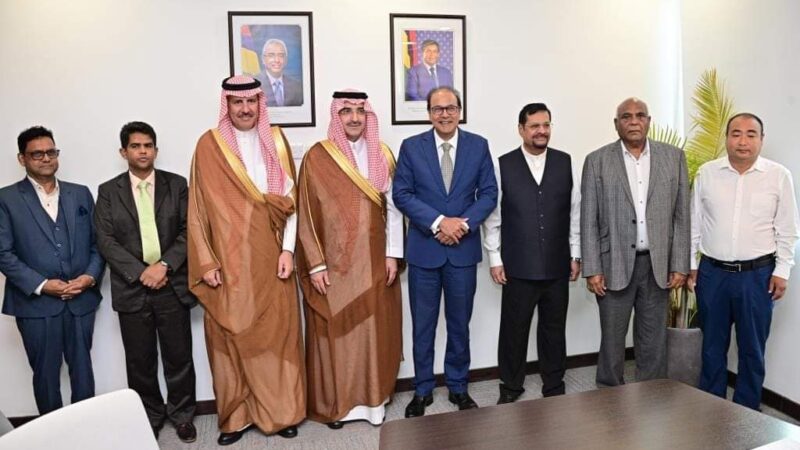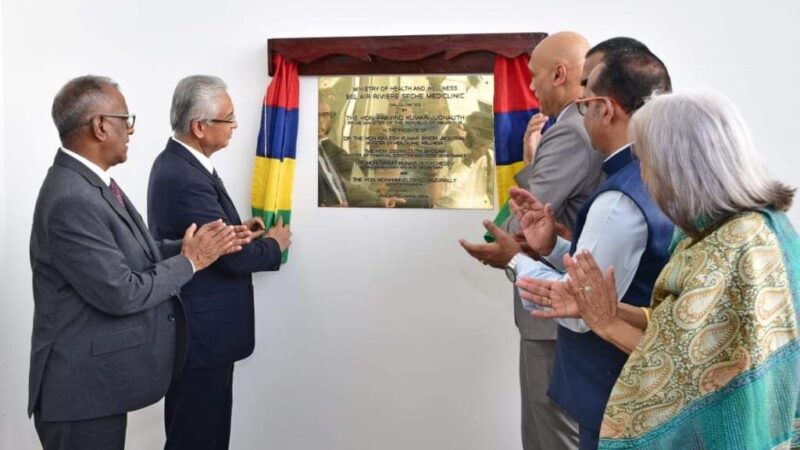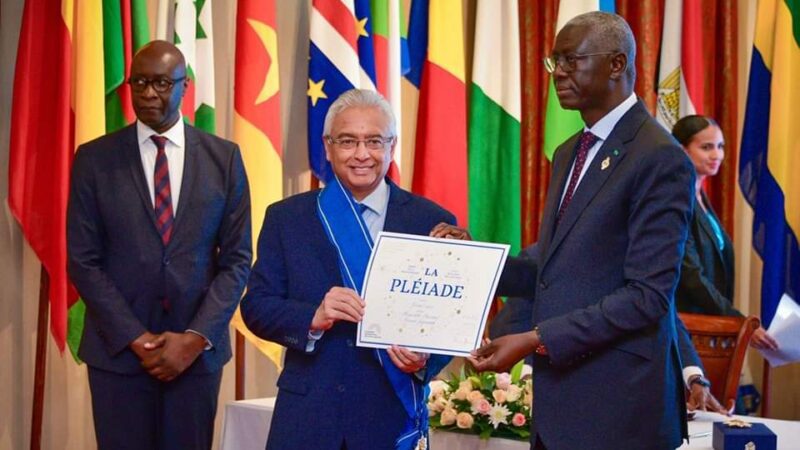The EU regional technical assistance facility Africa RISE and the Regional Multidisciplinary Centre of Excellence (RMCE) jointly organised a Peer-to-Peer Learning Workshop in Mauritius on Public-Private Dialogue on 8 February, in the presence of representatives of the Economic Development Board of Madagascar and international stakeholders.
Mauritius, 30 March 2023 – The EU regional technical assistance facility Africa RISE (Reform for Investment and Sustainable Economies), joined forces with the Regional Multidisciplinary Centre of Excellence (RMCE) to organise a Peer-to-Peer Learning Workshop on Public-Private Dialogue on 8 February 2023. The workshop was held in response to a request from the Economic Development Board of Madagascar (EDBM) which was seeking to learn about the best practices for Public-Private Dialogue in the region.
A plenary session was held on the first day in a hybrid format, bringing together leading public and private sector stakeholders from Mauritius and across the African continent to present specific examples of how collaboration through Public-Private Dialogue has helped their country.
Participants from Mauritius included representatives from Business Mauritius, the Economic Development Board (of Mauritius), the International Trade Division of the Ministry of Foreign Affairs, Regional Integration and International Trade, Eclosia Group and the Mauritius Chamber of Commerce and Industry, who highlighted how Public-Private Dialogue had helped the country to respond to the global financial crisis, and how this has contributed to trade agreement negotiations and business process reforms.
To offer the wider African perspective, international participants and stakeholders joined the session from a number of countries including Namibia, Tanzania, Rwanda, Ethiopia, Kenya, Madagascar, Zambia, France, Germany, United Kingdom, and Burundi, among others, to build their own knowledge and share their experiences and testimonies.
After the plenary session, Africa RISE and the RMCE facilitated two days of meetings where the representatives of the Economic Development Board of Madagascar met individual institutions both from the public and private sector to understand them in greater detail, provide their individual introductions, and dive deeper into their engagements in terms of Public-Private Dialogue.




Public-Private Dialogue is “ingrained in the DNA of Mauritius”
Commenting on the Peer-to-Peer Learning Workshop, Manisha Dookhony, Economics and Market Reform Key expert at Africa RISE, which covers 25 countries across the Eastern African region, Southern African region, and the Indian Ocean, said:
“Mauritius has a long history of more than 200 years of exchange between the public and the private sector, which began when the British took over the island from the French. The French settlers, who then became the private sector representatives, had to learn how to manage and interact with the British Government. Public-Private Dialogue has thus become ingrained in our DNA in Mauritius.”
“For the Peer-to-Peer Learning Workshop, we thought it would be important for us to learn from Mauritian examples as well as from international best practices, including those shared by Africa RISE consultants who have worked on bringing in best practices in regions across Africa.”
“At the same time, we also had an interaction with the RMCE in Mauritius, which too has a focus on the region with one of their key areas of expertise being peer-to-peer learning. Hence, we thought that partnering with the RMCE would be a great way to start the peer-to-peer initiative. We have, during all our interactions, met with experts and stakeholders within the sector who have imparted and shared their knowledge in a peer-to-peer learning format.”
A new model of Peer-to-Peer Learning for the region
The Regional Multidisciplinary Centre of Excellence (RMCE), based in Mauritius, was jointly created by COMESA, the Indian Ocean Commission and the Government of Mauritius. It is a platform to advance regional integration and economic development by coordinating economic reforms and promoting peer learning and peer support, which partnered with Africa RISE to organise the plenary session and meeting programme in response to the request from the EDBM.
Sharing his perspective on the Peer-to-Peer Learning Workshop, Prakash Hurry, Office in Charge, commented:
“The RMCE has conducted similar events in the past, but this time it was a new model. I think that Africa RISE should consider replicating this model of Peer-to-Peer Learning in different contexts in other countries. I think that it was very enriching.”
“In terms of its objectives in promoting peer-to-peer dialogue, under guidance from and in close partnership with Africa RISE, RMCE will build on its economic and diplomatic relationships with countries in the region to create a platform for peer learning, peer support and peer pressure.”
“The RMCE, in close collaboration with Africa RISE, will also follow up on further requests for support during implementation and assist in mobilizing the required expertise from peers, IFIs, G20, development partners and consultants.”
Establishing mutual confidence through Public-Private Dialogue for the good of the country
Commenting on the perspectives drawn from the visit, Dina ANDRIANTEFINIRINA, Chargée du Dialogue Public Privé at the Economic Development Board of Madagascar, said:
“We are here with the support of the EU, Africa RISE and the RMCE to see the best practices of public-private dialogue in Mauritius. We have met the private sector groups as well as the Mauritian authorities who are the stakeholders in the public-private dialogue. We were able to note their practices, which have been tested and which have demonstrated very concrete results.”
“We are here to see how to adapt all these best practices to improve public-private dialogue in Madagascar. All the actors have a common general objective, which is to develop the country, and to defend the interest of the country over and above individual interests.”
Tojo David RAMAMONJISOA, Directeur des Réformes et du Développement du Secteur Privé p.i., added :
“After these three days, what I remember as the background is the existence of mutual trust between all institutions, both public and private, and semi-public such as the MRA which administers taxes and customs. The common denominator is mutual trust and mutual understanding between the mission of each of the institutions. Everyone works to achieve a common goal which is the economic development of Mauritius in general.”
“I think that the model that exists in Mauritius of very close collaboration, which is not necessarily framed in a rigid framework, may be a possible solution to improve the dialogue between the public sector and the private sector in Madagascar. I think this is the main lesson that I will take away, but there were many examples of success stories and many best practices that were shared by our interlocutors here in Mauritius. We find ourselves very enriched by the three days spent here.”


